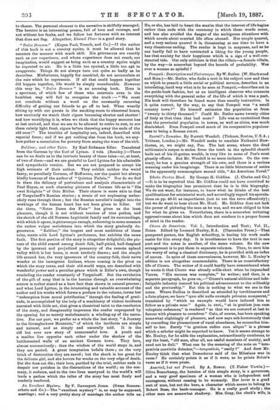Cicero de Senectute. Vol. I., Introduction and Text; Vol. II.,
Notes. Edited by Leonard Huxley, B.A. (Clarendon Press.)—That pampered person, the English schoolboy, is having his work made easier for him every day. It is troublesome to have the text in one part and the notes in another, of the same volume. So the new arrangement is to pat them in separate volumes. Then, to save him the worry of wing a classical dictionary, he is provided with an index of names. In spite of these conveniences, however, Mr. L. Huxley's edition is not altogether commendable. There is an unsatisfactory life of Cicero. The writer of it could hardly have remembered when be wrote it that Cicero was already tedile-elect when he impeached Verres. "His success was complete," he writes ; and then, in a separate paragraph, he goes on,—" Cicero's natural abilities and inde- fatigable industry insured his political advancement to the aelileship and the przetorship." But this is nothing to what we see in the notes. Where Dailies is described as attended by torchbearers and a flute-player, we have " qnce sibi nub ° exemplo privates sampserat," translated by "which no example would have induced him to follow as a private man." Again, in exvi., "at in 'gratiam jam cam voluptate redeamus," is rendered "so that we are restored at last to favour with pleasure to ourselves." Cato, of course, has been speaking somewhat slightingly of pleasure, and now says sub-humorously that by conceding the pleasantness of rural abundance, he reconciles him- self to her. Surely "in gratiam redire cum aliquo" is a phrase which a scholar might be expected to know. Yet it seems strange to Mr. Huxley, for he adds the explanation, extraordinarily cumbrous, to say the least, "old men, after all, are useful members of society, and need not be dull." What can be the meaning of the note on " tern- pestivis conviviis delector,"—tempestivis, " easily ?" And does Mr. Huxley think that what Demodocus said of the Milesiaus was in verse P He certainly prints it as if it ware, as he prints Solon's verse as if it were prose.


































 Previous page
Previous page